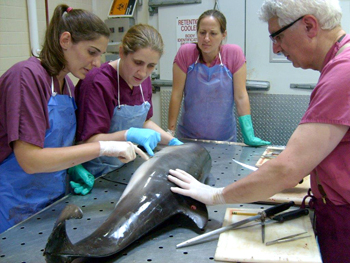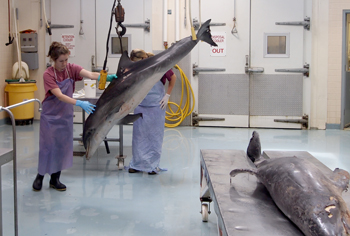Why the deep-sea Tursiops truncatus, commonly known as bottlenose dolphins, were washing ashore on the Atlantic Coast was a mystery. And as the numbers of dead increased, so did concern. On July 9, the National Oceanic and Atmospheric Administration (NOAA) declared an “unusual mortality event” so that the carcasses could be sent for autopsies to determine the cause of death.
For nearly 20 years, the Marine Mammal Stranding Center in Brigantine, New Jersey has been transporting dolphins, whales, seals, and other animals nearly three hours to Penn Vet’s New Bolton Center for autopsies.
 Dr. Perry Habecker, Chief of the Large Animal Pathology Service, and his team were ready. Because of the unusual mortality event, they were prepared to perform additional procedures, including collection of specimens to be sent to federal labs and other universities for further research.
Dr. Perry Habecker, Chief of the Large Animal Pathology Service, and his team were ready. Because of the unusual mortality event, they were prepared to perform additional procedures, including collection of specimens to be sent to federal labs and other universities for further research.
“It was clear the majority of dolphins had pneumonias consistent with virus infections,” Habecker said, recalling the autopsies in those early weeks of July. “They had lesion patterns characteristic of viral pneumonia.”
Cetacean morbillivirus was suspected from the start. Morbillivirus caused a major dolphin die-off 25 years earlier, killing more than 740 dolphins along the Atlantic Coast. Morbillivirus is related to measles in people and canine distemper in dogs, but it cannot be transmitted to humans. The symptoms can include skin lesions, pneumonia, and brain infections.
A total of 936 dolphins were stranded on the Atlantic Coast from July 1 through December 1, according to NOAA, compared to an average of 113 in the previous six years. A total of 135 dolphins were stranded in New Jersey, compared to five in an average year. (Stranding data includes mostly dead dolphins, many of them very decomposed, although a few were found alive.)
The deaths received national attention from the public, the media, and lawmakers. The New Jersey Department of Environmental Protection stepped in to help the nonprofit Marine Mammal Stranding Center with the crisis, awarding a grant to pay for the autopsies. As a result, the dolphin cases were diverted to the New Jersey Department of Agriculture laboratory at the end of August.
 New Bolton Center handled 40 dolphin autopsies in July and August, receiving up to four at one time, many of them badly decomposed. In a typical year, New Bolton Center handles about 12 dolphins and 12 seals.
New Bolton Center handled 40 dolphin autopsies in July and August, receiving up to four at one time, many of them badly decomposed. In a typical year, New Bolton Center handles about 12 dolphins and 12 seals.
“It takes the whole crew to manage that caseload,” Habecker said, including staff pathologists, residents, students, and post-mortem attendants. In addition to the gross autopsy, the team took tissue samples, prepared and analyzed glass slides, and wrote detailed reports. Immunohistochemistry (the process of detecting antigens in the cells of a tissue section) proved to be very effective for the analysis, Habecker said, identifying morbillivirus in about 75 percent of the cases.
“We were deluged by these creatures. Some of our students, I believe, are now expert marine mammal technicians because they got to work with so many dolphins,” said Habecker, a 1981 Penn Vet graduate who has been at New Bolton Center since 1989. “They came up to speed very quickly in the anatomy and the dissection procedure.”
Bob Schoelkopf, Director of the Marine Mammal Stranding Center, said he has been working with Penn Vet for 40 years. He believes involving students in the process is important. His interest in the educational component that Penn Vet offers makes it likely that he will continue to send animals to New Bolton Center for autopsies.
“For me, I see it as a way to have future veterinarians specialize in the field of marine mammals,” Schoelkopf said, noting that the warming trend in the oceans could impact a wide range of species. “There may be an even greater need for marine mammal vets in the future.”